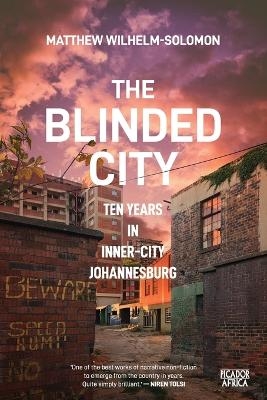
The Blinded City
Ten Years In Inner-City Johannesburg
Seiten
2022
Picador Africa (Verlag)
978-1-77010-794-6 (ISBN)
Picador Africa (Verlag)
978-1-77010-794-6 (ISBN)
- Titel nicht im Sortiment
- Artikel merken
Shortlisted for the 2023 Sunday Times Literary Awards
‘One of the best works of narrative non-fiction to emerge from the country in years. Quite simply brilliant.’ – NIREN TOLSI
Amid evictions, raids, killings, the drug trade, and fire, inner-city Johannesburg residents seek safety and a home. A grandmother struggles to keep her granddaughter as she is torn away from her. A mother seeks healing in the wake of her son’s murder. And displaced by the city’s drive for urban regeneration, a group of blind migrants try to carve out an existence.
The Blinded City recounts the history of inner-city Johannesburg from 2010 to 2019, primarily from the perspectives of the unlawful occupiers of spaces known as hijacked buildings, bad buildings or dark buildings. Tens of thousands of residents, both South African and foreign national, live in these buildings in dire conditions. This book tells the story of these sites and the court cases around them, which strike at the centre of who has the right to occupy the city.
In February 2010, while Johannesburg prepared for the FIFA World Cup, the South Gauteng High Court ordered the eviction of the unlawful occupiers of an abandoned carpet factory on Saratoga Avenue and that the city’s Metropolitan Municipality provide temporary emergency accommodation for the evicted. The case, which became known as Blue Moonlight and went to the Constitutional Court, catalysed a decade of struggles over housing and eviction in Johannesburg.
The Blinded City chronicles this case, among others, and the aftermath – a tumultuous period in the city characterised by recurrent dispossessions, police and immigration operations, outbursts of xenophobic violence, and political and legal change. All through the decade, there is the backdrop of successive mayors and their attempts to ‘clean up’ the city, and the struggles of residents and urban housing activists for homes and a better life. The interwoven narratives present a compelling mosaic of life in post-apartheid Johannesburg, one of the globe’s most infamous and vital cities.
‘One of the best works of narrative non-fiction to emerge from the country in years. Quite simply brilliant.’ – NIREN TOLSI
Amid evictions, raids, killings, the drug trade, and fire, inner-city Johannesburg residents seek safety and a home. A grandmother struggles to keep her granddaughter as she is torn away from her. A mother seeks healing in the wake of her son’s murder. And displaced by the city’s drive for urban regeneration, a group of blind migrants try to carve out an existence.
The Blinded City recounts the history of inner-city Johannesburg from 2010 to 2019, primarily from the perspectives of the unlawful occupiers of spaces known as hijacked buildings, bad buildings or dark buildings. Tens of thousands of residents, both South African and foreign national, live in these buildings in dire conditions. This book tells the story of these sites and the court cases around them, which strike at the centre of who has the right to occupy the city.
In February 2010, while Johannesburg prepared for the FIFA World Cup, the South Gauteng High Court ordered the eviction of the unlawful occupiers of an abandoned carpet factory on Saratoga Avenue and that the city’s Metropolitan Municipality provide temporary emergency accommodation for the evicted. The case, which became known as Blue Moonlight and went to the Constitutional Court, catalysed a decade of struggles over housing and eviction in Johannesburg.
The Blinded City chronicles this case, among others, and the aftermath – a tumultuous period in the city characterised by recurrent dispossessions, police and immigration operations, outbursts of xenophobic violence, and political and legal change. All through the decade, there is the backdrop of successive mayors and their attempts to ‘clean up’ the city, and the struggles of residents and urban housing activists for homes and a better life. The interwoven narratives present a compelling mosaic of life in post-apartheid Johannesburg, one of the globe’s most infamous and vital cities.
MATTHEW WILHELM-SOLOMON is a writer, editor and educator, who was born in Johannesburg. He has worked as a lecturer, researcher and writing fellow at the University of the Witwatersrand over the past decade. He holds a doctorate from the University of Oxford and has published widely in international journals and the South African media, as well as speaking internationally on his research on Johannesburg.
| Erscheinungsdatum | 06.06.2022 |
|---|---|
| Verlagsort | Illovo |
| Sprache | englisch |
| Maße | 156 x 234 mm |
| Themenwelt | Geisteswissenschaften ► Geschichte ► Regional- / Ländergeschichte |
| Geschichte ► Teilgebiete der Geschichte ► Kulturgeschichte | |
| Sozialwissenschaften | |
| Technik ► Architektur | |
| ISBN-10 | 1-77010-794-0 / 1770107940 |
| ISBN-13 | 978-1-77010-794-6 / 9781770107946 |
| Zustand | Neuware |
| Haben Sie eine Frage zum Produkt? |
Mehr entdecken
aus dem Bereich
aus dem Bereich
der stille Abschied vom bäuerlichen Leben in Deutschland
Buch | Hardcover (2023)
C.H.Beck (Verlag)
23,00 €
vom Mittelalter bis zur Gegenwart
Buch | Softcover (2024)
C.H.Beck (Verlag)
12,00 €


